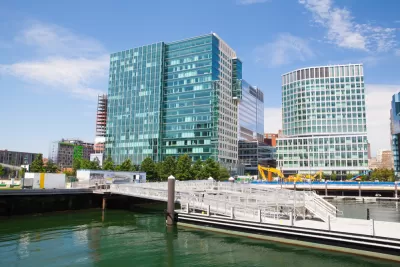Most people living in Boston's most expensive condominiums aren't from Boston, according to new research.

Tim Logan shares news of research from the Institute for Policy Studies in the Washington, D.C., which finds deficiencies in the city of Boston's luxury housing market.
"Many buyers of condominiums in the new luxury towers sprouting around Boston are either part-time residents or investors — sometimes with no clear connections to Boston," explains Logan of the study's findings, and "the city’s high-end building boom is doing little to help local residents."
After examining property records for 1,800 condos in 12 newer luxury buildings in Boston, researchers "found that more than one-third of the units are owned by limited liability companies, trusts, and other business entities that allow buyers to obscure their identities."
"Just 36 percent of owners requested the property tax exemption the city offers homeowners — a sign that the owners may live elsewhere most of the time," according to Logan.
The findings push back on the pro-development idea that new housing at the higher end of the market filters housing supply down to more affordable prices.
Since Logan broke the news of the study, Boston Mayor Marty Walsh told WGBH News that "plans to look at his policies affecting high-end construction," but isn’t interested in a tax on high-end real estate transactions.
FULL STORY: Boston’s new luxury towers appear to house few Bostonians

Alabama: Trump Terminates Settlements for Black Communities Harmed By Raw Sewage
Trump deemed the landmark civil rights agreement “illegal DEI and environmental justice policy.”

Planetizen Federal Action Tracker
A weekly monitor of how Trump’s orders and actions are impacting planners and planning in America.

The 120 Year Old Tiny Home Villages That Sheltered San Francisco’s Earthquake Refugees
More than a century ago, San Francisco mobilized to house thousands of residents displaced by the 1906 earthquake. Could their strategy offer a model for the present?

In Both Crashes and Crime, Public Transportation is Far Safer than Driving
Contrary to popular assumptions, public transportation has far lower crash and crime rates than automobile travel. For safer communities, improve and encourage transit travel.

Report: Zoning Reforms Should Complement Nashville’s Ambitious Transit Plan
Without reform, restrictive zoning codes will limit the impact of the city’s planned transit expansion and could exclude some of the residents who depend on transit the most.

Judge Orders Release of Frozen IRA, IIJA Funding
The decision is a victory for environmental groups who charged that freezing funds for critical infrastructure and disaster response programs caused “real and irreparable harm” to communities.
Urban Design for Planners 1: Software Tools
This six-course series explores essential urban design concepts using open source software and equips planners with the tools they need to participate fully in the urban design process.
Planning for Universal Design
Learn the tools for implementing Universal Design in planning regulations.
Clanton & Associates, Inc.
Jessamine County Fiscal Court
Institute for Housing and Urban Development Studies (IHS)
City of Grandview
Harvard GSD Executive Education
Toledo-Lucas County Plan Commissions
Salt Lake City
NYU Wagner Graduate School of Public Service





























